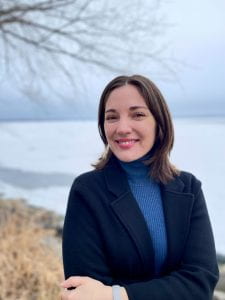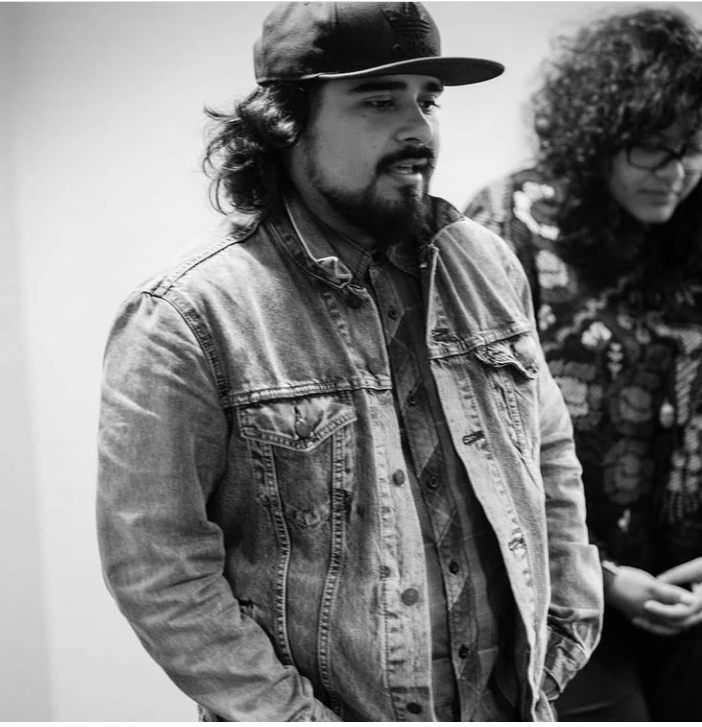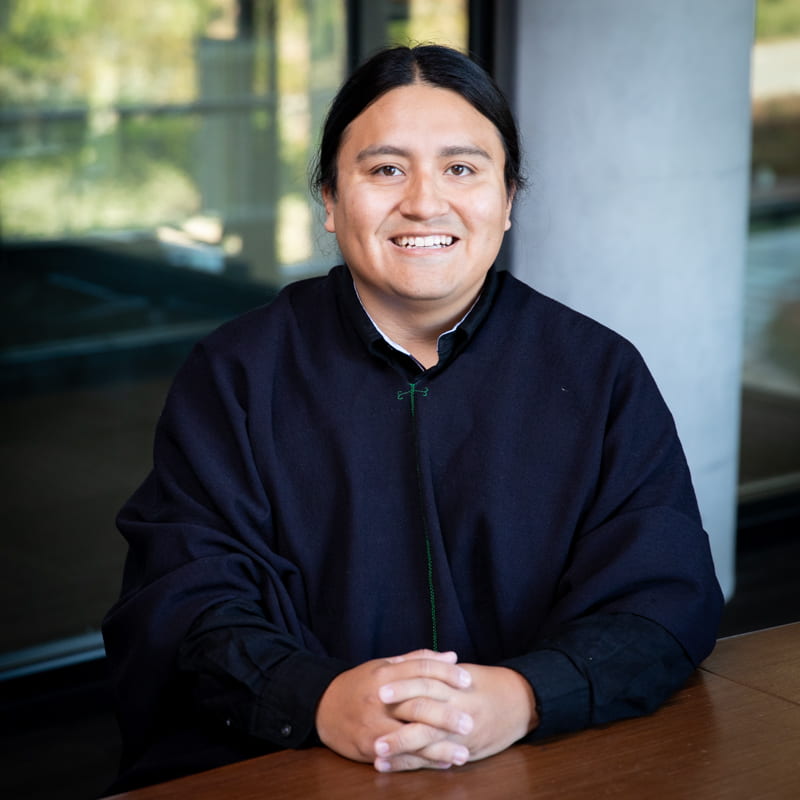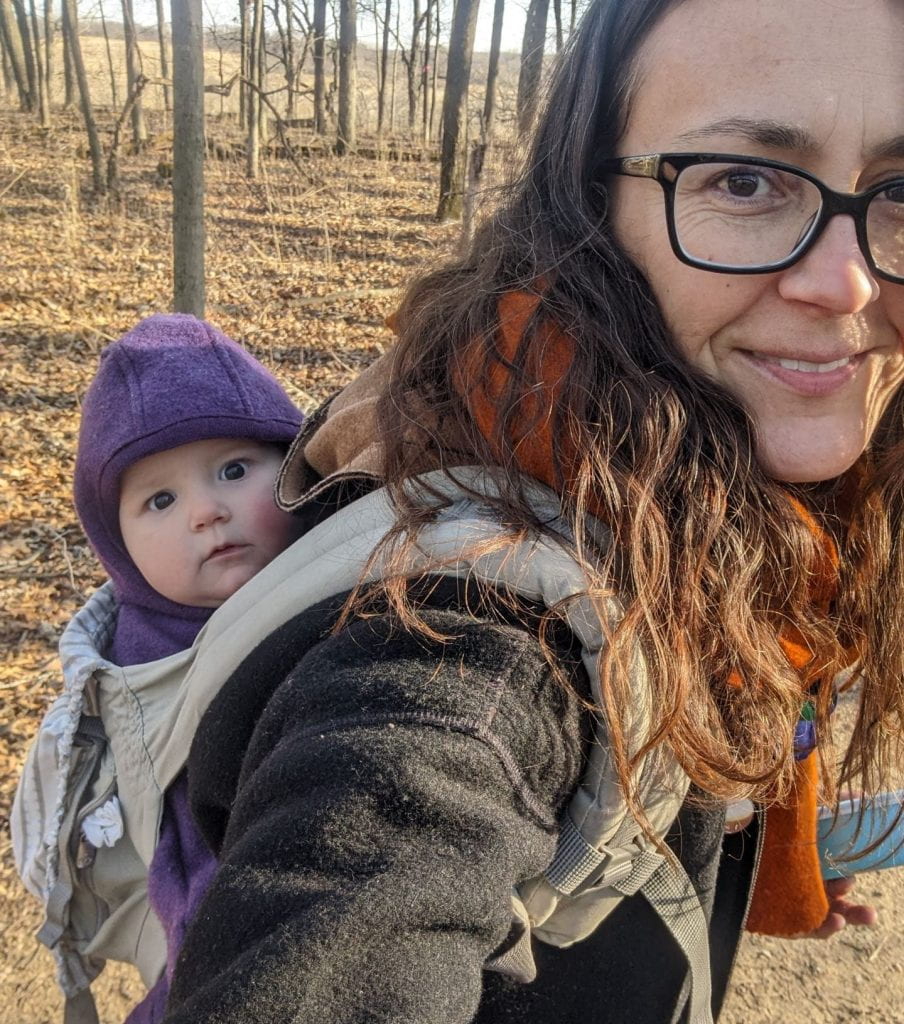2023 Climate Change and Indigenous Peoples Lecture
May 2, 2023 – 7:00 pm
Many Nations Longhouse – University of Oregon
The 2023 Climate Change and Indigenous Peoples Lecture will feature Jen Rose Smith, an assistant professor of Geography and American Indian Studies at the University of Wisconsin-Madison. The lecture will take place on May 2, 2023 at 7 pm in the Many Nations Longhouse at the University of Oregon.
Jen Rose Smith
 Jen Rose Smith (dAXunhyuu) is an assistant professor of Geography and American Indian Studies at the University of Wisconsin-Madison. She received her Ph.D. in Ethnic Studies from UC Berkeley. A recipient of fellowships from the ACLS, Ford Foundation, and the UC President’s Postdoctoral Program, Smith works at the intersection of race, indigeneity, and anti-coloniality in Alaska and the Arctic. She serves on the advisory board for the Eyak Cultural Foundation, a non-profit that organizes annual language and cultural revitalization gatherings in their homelands of Eyak, Alaska. She is working on a book manuscript called Icy Matters: Race Indigeneity and Coloniality in Ice-Geographies and has published in Environment and Planning D: Society and Space, Vogue Magazine, and The Geographic Journal. Smith is also part of the Editorial Collective at ACME: An International Journal for Critical Geographies.
Jen Rose Smith (dAXunhyuu) is an assistant professor of Geography and American Indian Studies at the University of Wisconsin-Madison. She received her Ph.D. in Ethnic Studies from UC Berkeley. A recipient of fellowships from the ACLS, Ford Foundation, and the UC President’s Postdoctoral Program, Smith works at the intersection of race, indigeneity, and anti-coloniality in Alaska and the Arctic. She serves on the advisory board for the Eyak Cultural Foundation, a non-profit that organizes annual language and cultural revitalization gatherings in their homelands of Eyak, Alaska. She is working on a book manuscript called Icy Matters: Race Indigeneity and Coloniality in Ice-Geographies and has published in Environment and Planning D: Society and Space, Vogue Magazine, and The Geographic Journal. Smith is also part of the Editorial Collective at ACME: An International Journal for Critical Geographies.
Respondents
The keynote lecture will feature student respondents and dialogue with Jen Rose Smith. The visiting respondents will include:
Wesley Carrasco. Born and Raised in South-Central Los Angeles, Wesley Carrasco is an Indigenous Lenca scholar in diaspora working on their first year (Ph.D) at the University of Washington in the Dep artment of Geography. They hold a B.A. in Geography/Environmental Studies from the University of California, Los Angeles (UCLA), and an M.A. from the University of Washington (UW) in Geography. Their work predominately focuses on Indigenous diasporic mobilities, water cosmologies, more-than-human relations, climate change, environmental justice, and rivers to have conversations on how Indigenous peoples carry land within themselves. Currently, they are working on a manuscript titled “Silence as Storytelling: Unspoken Methodologies of Indigenous Diasporas” a paper that engages silence as a methodologic praxis for future making, by asking us to engage silence not just as a byproduct of colonial violence, but an Indigenous politic of subversion that emphasizes futurity by learning to decipher the unspoken.
artment of Geography. They hold a B.A. in Geography/Environmental Studies from the University of California, Los Angeles (UCLA), and an M.A. from the University of Washington (UW) in Geography. Their work predominately focuses on Indigenous diasporic mobilities, water cosmologies, more-than-human relations, climate change, environmental justice, and rivers to have conversations on how Indigenous peoples carry land within themselves. Currently, they are working on a manuscript titled “Silence as Storytelling: Unspoken Methodologies of Indigenous Diasporas” a paper that engages silence as a methodologic praxis for future making, by asking us to engage silence not just as a byproduct of colonial violence, but an Indigenous politic of subversion that emphasizes futurity by learning to decipher the unspoken.
Luis Gonzalez-Quizhpe. Luis is a Graduate Project Assistant at the Center for Research on College-Workforce Transitions and a Kichwa Saraguro graduate student in the Latin  American, Caribbean and Iberian Studies MA Program at the University of Wisconsin-Madison. A Foreign Language and Area Studies Fellow, he currently studies education and community experiences of Latinx and Kichwa communities within rural and non-traditional spaces. He has a strong personal investment in the recovery of Indigenous cultures and languages, diasporic Indigenous identity development, the transmission of traditional cultural practices, and the well-being of youth and families. Luis holds a Bachelor of Arts in Sociology and a Certificate in Chicano and Latino Studies from the University of Wisconsin – Madison
American, Caribbean and Iberian Studies MA Program at the University of Wisconsin-Madison. A Foreign Language and Area Studies Fellow, he currently studies education and community experiences of Latinx and Kichwa communities within rural and non-traditional spaces. He has a strong personal investment in the recovery of Indigenous cultures and languages, diasporic Indigenous identity development, the transmission of traditional cultural practices, and the well-being of youth and families. Luis holds a Bachelor of Arts in Sociology and a Certificate in Chicano and Latino Studies from the University of Wisconsin – Madison
Kristin Klingman. Kristin is a member of the Lac Vieux Desert Band (LVD) in what is currently known as Watersmeet, MI in addition to a graduate student in Human Ecology  at the University of Wisconsin-Madison. As an apprenticing Anishinaabe weaver in traditional fiber arts, she works with culturally specific materials including cedar, basswood, bulrush and birch bark in addition to her handmade paper to weave in the ways of her ancestors, and to employ new techniques, poetically embedding new ideas, observations and concerns.
at the University of Wisconsin-Madison. As an apprenticing Anishinaabe weaver in traditional fiber arts, she works with culturally specific materials including cedar, basswood, bulrush and birch bark in addition to her handmade paper to weave in the ways of her ancestors, and to employ new techniques, poetically embedding new ideas, observations and concerns.
Sponsors
This lecture is sponsored by the Andrew W. Mellon Foundation, the Pacific Northwest Just Futures Institute for Racial and Climate Justice, and the UO Center for Environmental Futures, with additional support from UO Environmental Studies Program, UO Geography Department, UO Native American and Indigenous Studies, the Many Nations Longhouse, the UO Native American Student Union, and the Affiliated Tribes of Northwest Indians. This event is also part of the Pacific Northwest Tribal Climate Change Project.
For More Information:
Mark Carey, UO Geography and Environmental Studies, 541-346-8077, carey@uoregon.edu
Kathy Lynn, UO Environmental Studies, 541-206-3281, kathy@uoregon.edu
—————————————————————
The University of Oregon is located on Kalapuya Ilihi, the traditional indigenous homeland of the Kalapuya people. Following treaties between 1851 and 1855, Kalapuya people were dispossessed of their indigenous homeland by the United States government and forcibly removed to the Coast Reservation in Western Oregon. Today, descendants are citizens of the Confederated Tribes of Grand Ronde Community of Oregon and the Confederated Tribes of Siletz Indians of Oregon, and continue to make important contributions in their communities, at UO, and across the land we now refer to as Oregon.
We express our respect for all federally recognized Tribal Nations of Oregon. This includes the Burns Paiute Tribe, the Confederated Tribes of Coos, Lower Umpqua and Siuslaw Indians, the Confederated Tribes of Grand Ronde Community of Oregon, the Confederated Tribes of Siletz Indians of Oregon, the Confederated Tribes of the Umatilla Indian Reservation, the Confederated Tribes of Warm Springs, the Coquille Indian Tribe, the Cow Creek Band of Umpqua Tribe of Indians, and the Klamath Tribes. We also express our respect for all other displaced Indigenous peoples who call Oregon home.
* We thank the UO Libraries and Native Strategies Group for this statement on Honoring Native Peoples and Lands.
